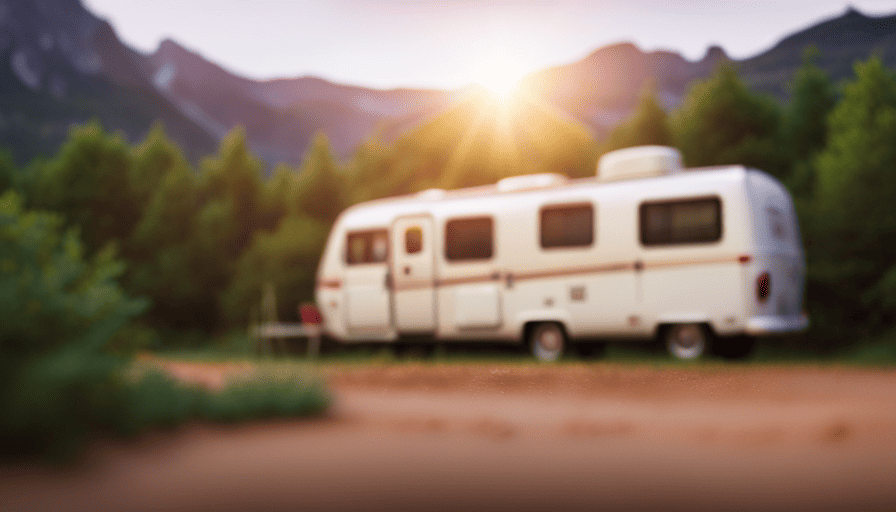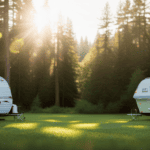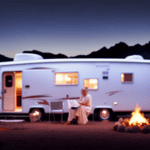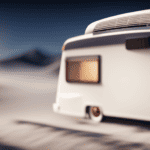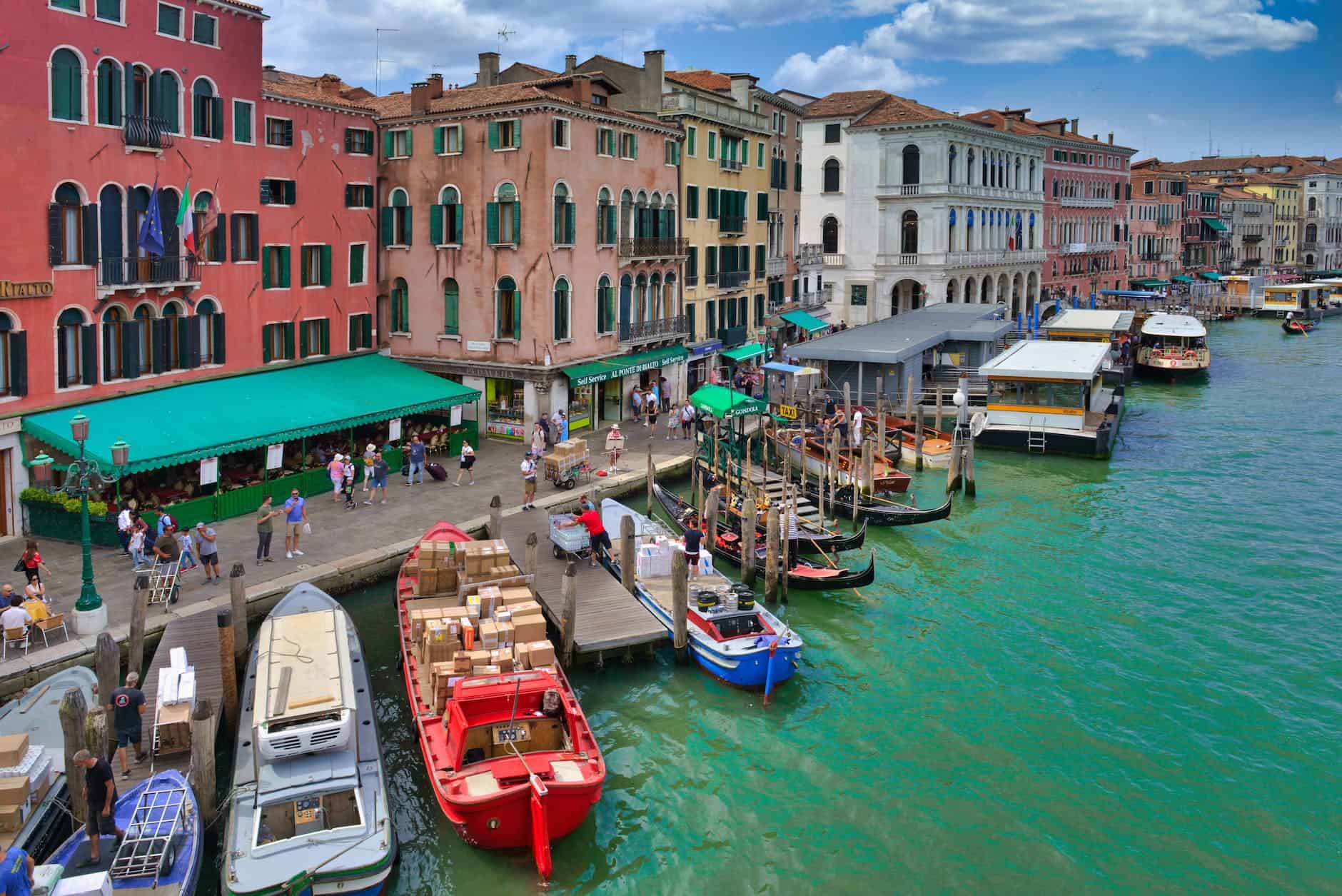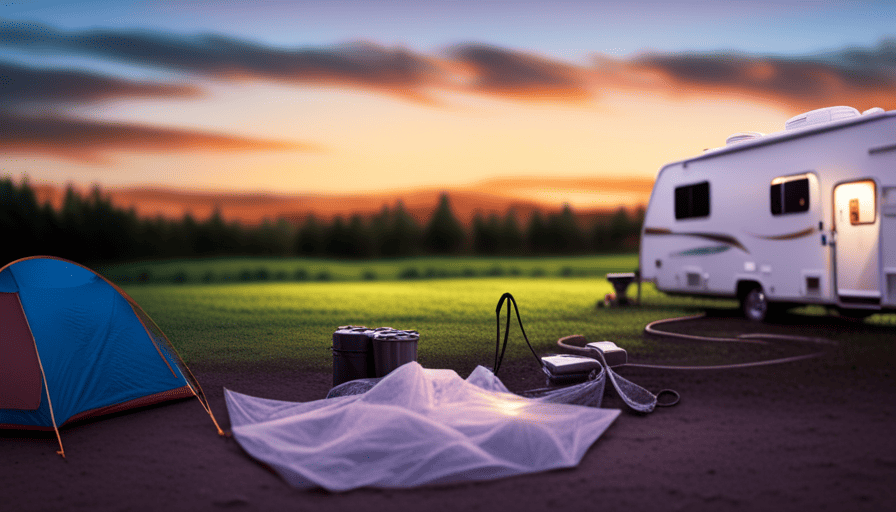Imagine being inside your camper on a scorching summer day, feeling the intense heat surround you like a weighty blanket. You long for a cool refuge, a break from the relentless sun.
That’s where a camper air conditioner (AC) comes in, like a lifesaver in the desert. But before you can enjoy the blissful coolness, you need to understand how many watts your camper AC requires.
In this article, I will guide you through the technicalities of camper AC units, helping you determine the wattage you need for a comfortable camping experience. We will explore different types of camper AC units and discuss the factors that affect their power consumption.
Furthermore, we will delve into power sources, including portable generators and solar power options, to ensure you have options for keeping your camper cool wherever you go.
So, let’s dive into the world of camper ACs and discover the power behind a refreshing retreat in the great outdoors.
Key Takeaways
- Camper air conditioners require 800-1500 watts of power.
- Power requirements vary based on factors like unit size, cooling capacity, and efficiency.
- Regular maintenance, such as cleaning air filters and condenser coils, improves system efficiency.
- Proper insulation, temperature settings, and energy-saving techniques can optimize AC efficiency and reduce power consumption.
Understanding Camper Air Conditioners
If you’re curious about camper air conditioners, you might be wondering how many watts they typically use. Understanding the power efficiency of these units is essential for maintaining a comfortable camping experience.
Camper air conditioners vary in their power consumption, but the average range is between 800 to 1500 watts. It’s important to note that this wattage can fluctuate depending on factors such as the size of the unit, its cooling capacity, and the overall efficiency of the system.
To ensure optimal power efficiency, there are a few maintenance tips to keep in mind. Firstly, regularly cleaning and replacing air filters is crucial. Clogged filters can restrict airflow, forcing the unit to work harder and consume more power. Additionally, inspecting and cleaning the condenser coils can improve the efficiency of the system. These coils tend to accumulate dirt and debris over time, hindering their ability to cool the air effectively.
Understanding the power requirements of your camper air conditioner is vital for a hassle-free camping experience. By knowing the average wattage and implementing proper maintenance practices, you can optimize the efficiency of your unit and ensure it operates smoothly. Keeping these factors in mind will help you make informed decisions about your camper air conditioner’s power needs and enhance your overall camping enjoyment.
The Importance of Power Requirements
Make sure you have enough electricity to keep your camper cool and comfortable during your outdoor adventures. Understanding the power requirements of your camper air conditioner is essential to ensure that you have a reliable power supply.
Camper air conditioners typically require a significant amount of power, so it’s crucial to have a power source that can meet these demands. The power requirement of a camper air conditioner is measured in watts. This measurement indicates the amount of electrical energy needed to run the AC unit efficiently. The wattage varies depending on the size and energy efficiency of the air conditioner. Energy-efficient camper AC units typically require fewer watts to operate, which can be beneficial if you have limited access to power.
To determine the power requirements of your camper air conditioner, check the manufacturer’s specifications or consult the owner’s manual. This information will provide you with the necessary details about the wattage needed for your specific AC unit. Once you know the power requirement, you can ensure that your power supply can handle the load.
Understanding the importance of power requirements is crucial to ensure that your camper AC unit operates efficiently. In the next section, we will discuss different types of camper AC units, highlighting their unique features and benefits.
Different Types of Camper AC Units
One of the most popular options for keeping your camper cool and comfortable during outdoor adventures is by utilizing different types of air conditioning units specifically designed for campers. These units come in various brands and offer different features to suit your needs.
Here are a few types of camper AC units to consider:
-
Rooftop Air Conditioners: These units are installed on the roof of the camper and provide efficient cooling. They’re compact and don’t take up valuable interior space.
-
Portable Air Conditioners: These units are freestanding and can be moved around as needed. They’re easy to install and provide cooling for specific areas of the camper.
-
Window Air Conditioners: Similar to those used in homes, these units are installed in a window or a specially designed opening in the camper. They’re cost-effective and provide powerful cooling.
-
Ducted Air Conditioners: These units use a network of ducts to distribute cool air throughout the camper. They offer a more even and consistent cooling experience.
To ensure the longevity and efficiency of your camper AC unit, it’s important to follow regular maintenance tips provided by the manufacturer. This includes cleaning or replacing air filters, checking for any leaks or damages, and scheduling professional inspections. Determining the wattage you need for your camper AC unit is crucial for proper functioning and energy efficiency.
Determining the Wattage You Need
Determining the wattage you’ll require for your camper’s air conditioning unit is essential for ensuring optimal cooling and energy efficiency. To calculate the energy usage of your AC unit, you need to consider a few factors.
The first step is to determine the size of the AC unit you’ll need. This depends on the size of your camper and the climate conditions you’ll be camping in. Generally, a camper AC unit requires around 1,000 to 2,000 watts of power. However, larger campers or extreme climates may require more wattage.
Once you have determined the size of the AC unit, you can calculate the energy usage by multiplying the unit’s wattage by the number of hours you plan to use it each day. For example, if you have a 1,500-watt AC unit and plan to use it for 8 hours a day, the energy usage would be 12,000 watt-hours or 12 kilowatt-hours (kWh) per day.
Choosing the right size AC unit and calculating the energy usage is crucial for preventing power overloads and ensuring efficient cooling. In the next section, we’ll discuss the factors that affect power consumption, such as insulation, temperature settings, and usage patterns. These factors play a significant role in determining the overall power consumption of your camper’s AC unit.
Factors That Affect Power Consumption
Insulation and temperature settings can significantly impact how much power your air conditioning unit guzzles up. When it comes to factors affecting efficiency, insulation plays a crucial role. Proper insulation in your camper helps to keep the cool air inside and the hot air outside. This means that your air conditioning unit doesn’t have to work as hard to maintain the desired temperature, thus reducing its power consumption.
Another factor that affects power consumption is the temperature setting of your camper AC. Setting the temperature too low can cause the unit to run longer and consume more power. It’s important to find a balance between comfort and energy efficiency. Adjusting the temperature by a few degrees can make a significant difference in power usage.
In addition to insulation and temperature settings, there are also energy-saving techniques that can help reduce power consumption. For example, using ceiling fans in conjunction with your air conditioning unit can help circulate the cool air more effectively, allowing you to raise the temperature setting without sacrificing comfort. Additionally, keeping doors and windows closed while the AC is running prevents cool air from escaping and hot air from entering.
Insulation and temperature settings are important factors that affect the power consumption of your camper AC. Implementing energy-saving techniques can further optimize efficiency.
Now, let’s move on to tips for efficiently using your camper AC.
Tips for Efficiently Using Your Camper AC
To maximize the efficiency of your camper’s AC, try adjusting the temperature settings and utilizing energy-saving techniques. Efficient cooling is key when it comes to using your camper AC.
Start by setting your thermostat at a comfortable temperature, but avoid setting it too low as this’ll consume more power.
It’s also important to keep the windows and doors closed to prevent cool air from escaping and warm air from entering.
Another tip is to use curtains or blinds to block out the sun and keep the temperature inside the camper cooler.
Additionally, consider using a fan in conjunction with your AC to circulate the cool air more effectively.
Regularly clean or replace the air filters to ensure proper airflow and reduce strain on the AC unit.
Lastly, consider using a portable generator or solar panels as alternative power sources for your camper AC.
By following these energy-saving tips, you can efficiently cool your camper while minimizing power consumption.
Transitioning to the subsequent section about power sources, it’s important to understand how different options can affect your camper’s AC unit.
Power Sources for Camper AC Units
One convenient option for powering your camper’s AC unit is by using a portable generator or solar panels. When it comes to power options for camper AC units, these two sources are reliable and efficient.
Portable generators can provide the necessary wattage to run your AC unit, ensuring you stay cool during your camping trip. It’s important to choose a generator with enough power capacity to match the wattage requirements of your AC unit. This information can usually be found in the AC unit’s specifications or user manual.
Additionally, solar panels can be a great alternative for powering your AC unit while also being environmentally friendly. By harnessing the power of the sun, solar panels can generate electricity to run your AC unit. However, it’s important to note that the energy efficiency of your camper’s AC unit will impact the amount of power it requires. Therefore, it’s advisable to invest in an energy-efficient AC unit to minimize power consumption.
With these power options and energy-efficient choices, you can enjoy the comfort of your camper’s AC unit while camping.
Transitioning into the subsequent section about portable generators for camping, let’s explore how these generators provide a reliable power source for your camper.
Portable Generators for Camping
When you go camping, bringing along a portable generator can be a great solution for providing reliable power to your camper’s AC unit, ensuring you have a comfortable and cool experience. Portable generators are a popular choice for campers due to their convenience and versatility.
These generators are designed to be lightweight and compact, making them easy to transport and set up at your campsite.
One of the key factors to consider when choosing a portable generator for your camper is the wattage output. The wattage requirements for your AC unit will vary depending on its size and efficiency. It’s important to check the specifications of your AC unit to determine the wattage it requires. Most camper AC units typically require around 1,000 to 3,500 watts to function properly.
In addition to wattage, another important consideration when selecting a portable generator is the noise level. Camping is all about enjoying nature and the tranquility it offers, so you want to ensure that your generator operates quietly. Look for generators that are specifically designed for camping and have low noise levels, typically around 50 to 60 decibels.
Transitioning into the subsequent section about solar power options for camper AC, it’s important to explore alternative power sources that can provide sustainable and eco-friendly energy for your camper.
Solar Power Options for Camper AC
Solar power offers a sustainable and environmentally friendly solution for powering your camper’s air conditioning system, allowing you to enjoy cool and comfortable adventures in the great outdoors. When considering solar power options for camper AC, it is important to understand the efficiency of solar panels and the battery storage capacity required to meet your needs.
To determine the solar panel efficiency, it is essential to consider the conversion rate of sunlight into electricity. Higher efficiency solar panels can generate more power with the same amount of sunlight, ensuring optimal performance for your camper AC. Additionally, battery storage plays a crucial role in powering the AC when sunlight is not available. A larger battery capacity allows for longer operation times and ensures a constant power supply.
To better understand the relationship between solar panel efficiency, battery storage, and camper AC power consumption, refer to the table below:
| Solar Panel Efficiency | Battery Storage Capacity | Camper AC Power Consumption |
|---|---|---|
| High | Large | High |
| Medium | Medium | Moderate |
| Low | Small | Low |
By carefully considering solar panel efficiency and battery storage capacity, you can ensure a comfortable camping experience with your camper AC. Transitioning into the subsequent section, it is important to explore other factors that contribute to a pleasant outdoor adventure.
Ensuring a Comfortable Camping Experience
Creating a comfortable camping experience is essential for enjoying your time in the great outdoors. When it comes to camping with an AC unit, maximizing energy efficiency is crucial to ensure a pleasant and uninterrupted camping experience.
Here are some tips and techniques to help you troubleshoot common AC problems and create a comfortable environment inside your camper:
-
Insulate your camper: Proper insulation can help maintain a comfortable temperature inside the camper and reduce the load on your AC unit.
-
Use window coverings: Install blinds or curtains to block out sunlight and keep the interior cool.
-
Maintain proper airflow: Clean the AC filters regularly to ensure optimal airflow and efficient cooling.
-
Seal gaps and cracks: Inspect your camper for any gaps or cracks that may let the cool air escape, and seal them properly.
-
Optimize thermostat settings: Set your thermostat to a reasonable temperature to avoid unnecessary strain on the AC unit.
By following these tips, you can create a comfortable camping experience while maximizing energy efficiency. It’s important to troubleshoot any common AC problems promptly to prevent discomfort and ensure a smooth camping trip.
Frequently Asked Questions
Can I use a regular household air conditioner in my camper?
Certainly! While a regular household air conditioner may seem appealing for your camper, it’s important to consider the differences between portable and built-in camper AC units.
Portable units offer flexibility but may lack energy efficiency compared to built-in units. On the other hand, built-in units are specifically designed for campers and often prioritize energy efficiency.
So, when deciding, weigh the pros and cons of each option to ensure optimal cooling while conserving energy.
How long can I run my camper AC unit on a portable generator?
When considering how long you can run your camper AC unit on a portable generator, it’s important to choose the right size generator. A portable generator can provide power to your AC unit, but you need to ensure that the generator has enough wattage to handle the AC’s power requirements.
It’s recommended to use a generator with a higher wattage rating than the AC’s starting and running wattage. This way, you can power your camper AC unit without any issues, whether you’re using a portable generator or campground power.
Are there any energy-saving features available in camper AC units?
There are several energy-efficient options available in camper AC units, including the use of inverter technology. Inverter ACs offer numerous benefits, such as precise temperature control and lower energy consumption. By adjusting the compressor speed based on the cooling requirements, inverter ACs can operate at variable speeds, saving energy compared to traditional AC units.
This technology ensures optimal performance and increased energy savings, making it a great choice for campers looking to conserve power.
Can I use solar power to run my camper AC unit?
Yes, you can use solar power to run your camper AC unit. By using batteries for the camper AC, you can store the energy generated by solar panels. This allows you to power the AC unit even when there’s no direct sunlight.
The benefits of using solar power for your camper AC include reducing your reliance on traditional power sources, saving money on electricity bills, and having a greener and more sustainable energy solution.
What are some tips for maintaining and cleaning my camper AC unit?
Maintaining and cleaning your camper AC unit is crucial for its optimal performance. Here are some essential tips for troubleshooting common problems and choosing the right size unit.
First, regularly clean or replace the air filters to ensure proper airflow.
Secondly, check for any leaks or damage in the ductwork and seal them promptly.
Lastly, consider the size and BTU capacity of the AC unit to match the needs of your camper.
By following these guidelines, you’ll enjoy cool comfort on your camping adventures.
What Is the Power Consumption of a Camper AC?
The power consumption of a camper AC varies depending on its size and efficiency. On average, camper ac usage in watts can range from 1,000 to 2,500 watts when running. It’s crucial to consider this energy requirement while planning your power sources, especially when camping off-grid or using a generator.
Conclusion
In conclusion, understanding the power requirements of camper air conditioners is crucial for a comfortable camping experience. Just as a skilled architect carefully plans and measures every inch of a building, campers must consider the wattage needed for their AC units.
Like a conductor leading an orchestra, they must also consider factors that affect power consumption. Whether utilizing portable generators or harnessing the power of the sun, campers can create their own symphony of comfort amidst the great outdoors.
So, let the cool breeze of knowledge guide you on your camping journey, and may your adventures be filled with refreshing comfort.

